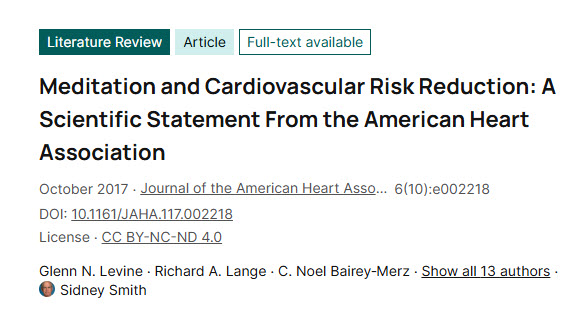Provides 37 pages of summaries from decades of research concerning how meditation affects heart related functioning (blood pressure, heart rate, etc.)
Abstract
Despite numerous advances in the prevention and treatment of atherosclerosis, cardiovascular disease remains a leading cause of morbidity and mortality. Novel and inexpensive interventions that can contribute to the primary and secondary prevention of cardiovascular disease are of interest. Numerous studies have reported on the benefits of meditation. Meditation instruction and practice is widely accessible and inexpensive and may thus be a potential attractive cost-effective adjunct to more traditional medical therapies. Accordingly, this American Heart Association scientific statement systematically reviewed the data on the potential benefits of meditation on cardiovascular risk. Neurophysiological and neuroanatomical studies demonstrate that meditation can have long-standing effects on the brain, which provide some biological plausibility for beneficial consequences on the physiological basal state and on cardiovascular risk. Studies of the effects ofmeditation on cardiovascular risk have included those investigating physiological response to stress, smoking cessation, blood pressure reduction, insulin resistance and metabolic syndrome, endothelial function, inducible myocardial ischemia, and primary and secondary prevention of cardiovascular disease. Overall, studies of meditation suggest a possible benefit on cardiovascular risk, although the overall quality and, in some cases, quantity of study data are modest. Given the low costs and low risks of this intervention, meditation may be considered as an adjunct to guideline-directed cardiovascular risk reduction by those interested in this lifestyle modification, with the understanding that the benefits of such intervention remain to be better established. Further research on meditation and cardiovascular risk is warranted. Such studies, to the degree possible, should utilize randomized study design, be adequately powered to meet the primary study outcome, strive to achieve low drop-out rates, include long-term follow-up, and be performed by those without inherent bias in outcome.

